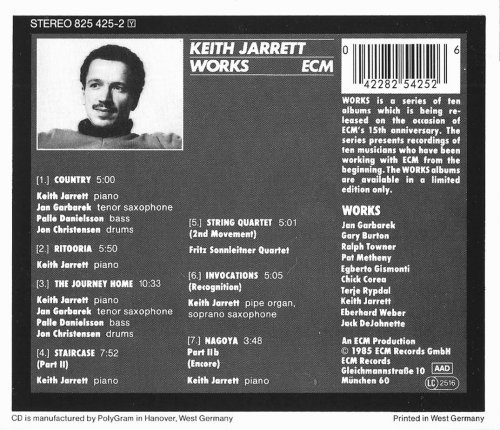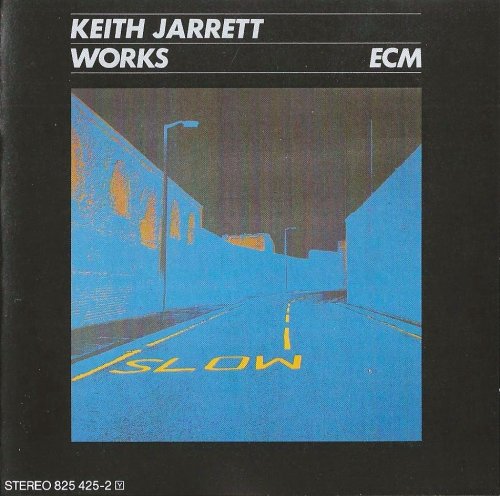
Keith Jarrett - Works (1985) CD-Rip
BAND/ARTIST: Keith Jarrett
- Title: Works
- Year Of Release: 1985
- Label: ECM
- Genre: Jazz
- Quality: FLAC (image+.cue,log,scans)
- Total Time: 43:20
- Total Size: 222 Mb
- WebSite: Album Preview
Tracklist:
1. Country 5:07
2. Ritooria 5:55
3. The Journey Home 10:39
4. Staircase (Part II) 7:57
5. String Quartet (2nd Movement) 5:08
6. Invocations (Recognition) 5:09
7. Nagoya (Part II B) 3:48
Performers:
Keith Jarret - piano, pipe organ
Jan Garbarek - saxophone
Palle Danielsson - bass
Jon Christensen - drums
Fritz Sonnleitner Quartet

1. Country 5:07
2. Ritooria 5:55
3. The Journey Home 10:39
4. Staircase (Part II) 7:57
5. String Quartet (2nd Movement) 5:08
6. Invocations (Recognition) 5:09
7. Nagoya (Part II B) 3:48
Performers:
Keith Jarret - piano, pipe organ
Jan Garbarek - saxophone
Palle Danielsson - bass
Jon Christensen - drums
Fritz Sonnleitner Quartet
If the artists represented by ECM’s “Works” series so far have been princes, then Keith Jarrett would be candidate for their king. The pianist (and multi-instrumentalist besides), composer, and interpreter continues to chart the most prolific path through the label’s history in solo, trio, and quartet settings, as well as through the lenses of multiple genres. For this compilation, we encounter all of those strands, save for his trio outings, which would warrant a collection in and of itself.
Two tunes from his second European Quartet album, 1978’s My Song, touch our collective soul with a highly individualistic tone. “Country” reinscribes the unrepeatable nature of the band. From the ways in which piano and Jan Garbarek’s tenor saxophone lay down the theme while the rhythm section of bassist Palle Danielsson and drummer Jon Christensen emotes with equal assurance in horizontal (not vertical) relation to the exuberant restraint of Jarrett’s grounding throughout, it’s a tune that feels as much like a farewell as a hello. We then find ourselves walking “The Journey Home.” As Garbarek leads with melodic fortitude, he sets up a welcoming groove of light. Christensen is especially three-dimensional, while Jarrett defers to Garbarek’s charms and really only dominates in the final slowdown.
From that rich soundscape to the wonders of unaccompanied hideaways, we turn to “Ritooria,” from Jarrett’s 1972 ECM debut, Facing You. Like a candle burning in the dark for all who have ears to sense its dancing flame, it holds on to its wick in the left hand while the right flickers erratically yet connectedly. Another lone effort, Staircase, yields Part II of that 1977’s album’s title triptych. If you haven’t already revisited it, let this track remind you of it as one of Jarrett’s finest studio achievements alone at the piano. Like two transparencies of the same image overlapped yet slightly askew, it develops through not-quite-parallel voices, ending in almost ritualistic space. The only live solo selection is “Nagoya Part IIb (Encore)” from 1989’s Sun Bear Concerts. Treading the keyboard as if it were water, Jarrett holds every note in place before finding rest in gentle chords.
Between these relatively direct expressions of personal energy, Jarrett the composer is represented by the 2nd movement of his String Quartet, as performed by the Fritz Sonnleitner Quartet on 1974’s In The Light. Despite being a lovely work in its own right, it feels straightjacketed in its present company. (I might have chosen the beautiful Metamorphosis for flute and strings from that same program instead.) Somewhere in between those two poles of classicalist and improviser is Jarrett’s often-overlooked 1981 masterpiece Invocations/The Moth and the Flame, from which “Invocations (Recognition)” is excerpted. A semi-waltzing rhythm via pipe organ sets up an echoing soprano saxophone, warped and yet flowing in the right direction at any given moment. All of which serves to remind us that we are indeed nothing but moths in the presence of Jarrett’s alluring combustion, struggling to recreate our shape in the air long enough to be regarded as (to reference a much later title) a multitude of angels struggling to record what can never be notated, except on the ephemeral paper of the flesh.
Two tunes from his second European Quartet album, 1978’s My Song, touch our collective soul with a highly individualistic tone. “Country” reinscribes the unrepeatable nature of the band. From the ways in which piano and Jan Garbarek’s tenor saxophone lay down the theme while the rhythm section of bassist Palle Danielsson and drummer Jon Christensen emotes with equal assurance in horizontal (not vertical) relation to the exuberant restraint of Jarrett’s grounding throughout, it’s a tune that feels as much like a farewell as a hello. We then find ourselves walking “The Journey Home.” As Garbarek leads with melodic fortitude, he sets up a welcoming groove of light. Christensen is especially three-dimensional, while Jarrett defers to Garbarek’s charms and really only dominates in the final slowdown.
From that rich soundscape to the wonders of unaccompanied hideaways, we turn to “Ritooria,” from Jarrett’s 1972 ECM debut, Facing You. Like a candle burning in the dark for all who have ears to sense its dancing flame, it holds on to its wick in the left hand while the right flickers erratically yet connectedly. Another lone effort, Staircase, yields Part II of that 1977’s album’s title triptych. If you haven’t already revisited it, let this track remind you of it as one of Jarrett’s finest studio achievements alone at the piano. Like two transparencies of the same image overlapped yet slightly askew, it develops through not-quite-parallel voices, ending in almost ritualistic space. The only live solo selection is “Nagoya Part IIb (Encore)” from 1989’s Sun Bear Concerts. Treading the keyboard as if it were water, Jarrett holds every note in place before finding rest in gentle chords.
Between these relatively direct expressions of personal energy, Jarrett the composer is represented by the 2nd movement of his String Quartet, as performed by the Fritz Sonnleitner Quartet on 1974’s In The Light. Despite being a lovely work in its own right, it feels straightjacketed in its present company. (I might have chosen the beautiful Metamorphosis for flute and strings from that same program instead.) Somewhere in between those two poles of classicalist and improviser is Jarrett’s often-overlooked 1981 masterpiece Invocations/The Moth and the Flame, from which “Invocations (Recognition)” is excerpted. A semi-waltzing rhythm via pipe organ sets up an echoing soprano saxophone, warped and yet flowing in the right direction at any given moment. All of which serves to remind us that we are indeed nothing but moths in the presence of Jarrett’s alluring combustion, struggling to recreate our shape in the air long enough to be regarded as (to reference a much later title) a multitude of angels struggling to record what can never be notated, except on the ephemeral paper of the flesh.

Jazz | FLAC / APE | CD-Rip
As a ISRA.CLOUD's PREMIUM member you will have the following benefits:
- Unlimited high speed downloads
- Download directly without waiting time
- Unlimited parallel downloads
- Support for download accelerators
- No advertising
- Resume broken downloads


